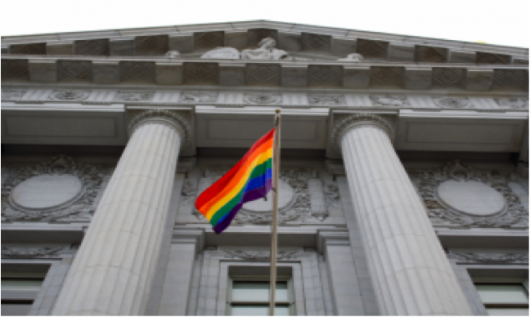Throughout NCAC’s 40th anniversary year, we’ll highlight a series of Top 40 lists, the first of which is a compilation of people, organizations, laws and actions that are threatening free speech today. Check out our other Top 40s, including the best censored films, books, and this year’s honorable Free Speech Defenders.
40. Sex-Obsessed Nipplephobics
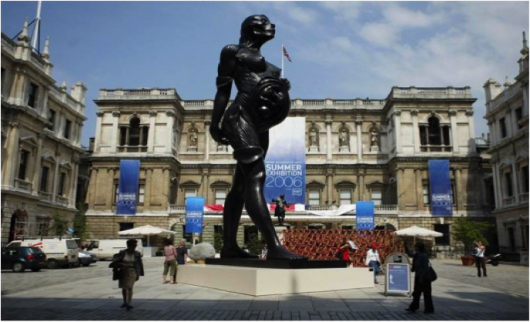 Artistic representations of nudes are often banned from public places under pressure from people who associate all representations of nudity with pornography or sex. Needless to say, nudes, even if they appeal to someone’s sexual imagination, are not obscene. To be legally obscene, material should, among other criteria, lack serious social, political, or artistic value. Such was far from the case for three paintings that contained nudity and were hence removed from the Hispanic Heritage Art Exhibit on display at the San Bernardino County Government Center. Also consider the case of Damien Hirst’s The Virgin Mother, a 33-foot sculpture that explores life, death, birth, and humanity, among other subjects. It has been on display around the world; however, the sculpture has not been made welcome in its new home on a private lawn in Old Westbury, Long Island. Neighbors are trying to have new height restrictions imposed that would result in the removal of this piece.
Artistic representations of nudes are often banned from public places under pressure from people who associate all representations of nudity with pornography or sex. Needless to say, nudes, even if they appeal to someone’s sexual imagination, are not obscene. To be legally obscene, material should, among other criteria, lack serious social, political, or artistic value. Such was far from the case for three paintings that contained nudity and were hence removed from the Hispanic Heritage Art Exhibit on display at the San Bernardino County Government Center. Also consider the case of Damien Hirst’s The Virgin Mother, a 33-foot sculpture that explores life, death, birth, and humanity, among other subjects. It has been on display around the world; however, the sculpture has not been made welcome in its new home on a private lawn in Old Westbury, Long Island. Neighbors are trying to have new height restrictions imposed that would result in the removal of this piece.
39. South Carolina Legislature
Gay book bashing is underway in South Carolina after a state legislator proposed funding cuts to two SC colleges for assigning to incoming freshman Fun Home, Alison Bechdel’s account of growing up with a closeted gay dad, and Out Loud: The Best of Rainbow Radio, a collection of stories from SC’s first gay and lesbian radio show. Rep. Garry Smith proclaimed, “I understand diversity and academic freedom… This is purely promotion of a lifestyle with no academic debate.” NCAC’s letter to the legislature: “The Supreme Court has sent a clear message over decades: Lawmakers may not prohibit the expression of ideas simply because they find them to be offensive.”
38. No-Drama School Administrators
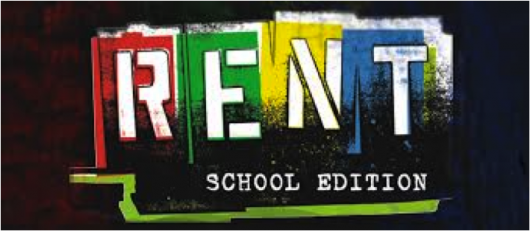 Trumbull High School Principal Marc Guarino nixed plans for the student production of RENT, calling it too controversial. With the support of the Dramatists Guild of America, students protested with a petition garnering more than 1,500 signatures and tracked growing national media coverage on Facebook. In a victory for school drama and musical theater companies, the show did go on. Standing ovation to the students who persevered and brought about a compelling production that started a greater discussion about the importance of trusting youth as advocates of their right to free expression.
Trumbull High School Principal Marc Guarino nixed plans for the student production of RENT, calling it too controversial. With the support of the Dramatists Guild of America, students protested with a petition garnering more than 1,500 signatures and tracked growing national media coverage on Facebook. In a victory for school drama and musical theater companies, the show did go on. Standing ovation to the students who persevered and brought about a compelling production that started a greater discussion about the importance of trusting youth as advocates of their right to free expression.
37. Parental Rights Laws
In New Hampshire, parents can limit what their kids learn in school. A state law lets parents who object, for any reason, to material used to teach any subject may request a different course of study for their child, even if the material is educationally valuable. In some cases, parental objections have led to the removal of material for other people’s kids as well, affecting kids whose parents want them to be taught that material. In Idaho, a proposed law would grant parents “primary control” over their child’s education, regardless of its impact on the education their children receive. Other states allow parents to opt their kids out of sex education (even if the kids want to attend the classes) or to object to an assignment on religious or moral grounds (also, potentially trumping the student’s beliefs). So much for educating kids or respecting them: it’s all about giving parents control over kids’ minds, lest they learn or think something different than what their parents want.
36. Criminal Prosecutions of Manga
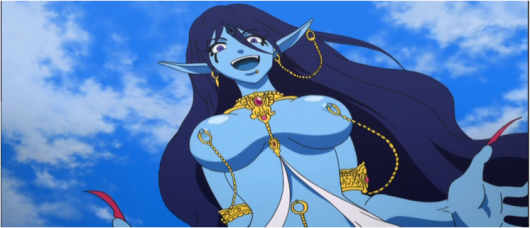 The rights of manga readers are increasingly jeopardized. As the Japanese comic form becomes more popular in the U.S., the Comic Book Legal Defense Fund says it’s becoming distressingly easy to get caught in a “wave of moral panic that is attempting to falsely equate sexually explicit art with the sexual exploitation and abuse of real children.” Japanese culture has vastly different taboos about sexual content and nudity, leading to misunderstandings and prosecutions of manga here in North America.
The rights of manga readers are increasingly jeopardized. As the Japanese comic form becomes more popular in the U.S., the Comic Book Legal Defense Fund says it’s becoming distressingly easy to get caught in a “wave of moral panic that is attempting to falsely equate sexually explicit art with the sexual exploitation and abuse of real children.” Japanese culture has vastly different taboos about sexual content and nudity, leading to misunderstandings and prosecutions of manga here in North America.
35. Abstinence-Only Sex Education
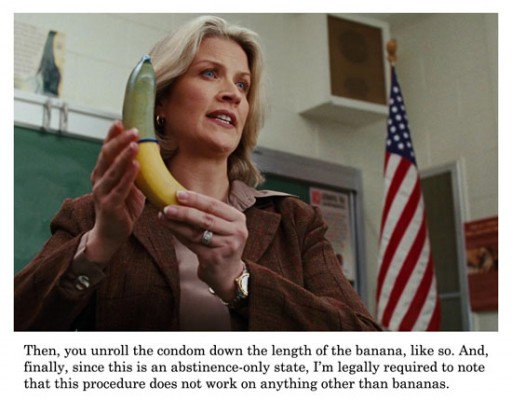
34. NC-17
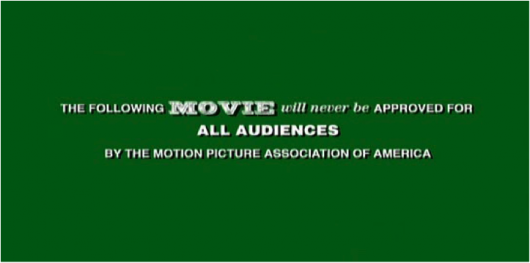 The MPAA rating system is a pervasive form of economic censorship. Even though the government isn’t the bad actor, it has wide-ranging effects on the culture at large. – Shunned by the multiplexed who rely on a large teen audience, NC-17 films are relegated to arthouse theatres and confined to the large urban communities that have such theaters. As a result, the big studios treat an NC-17 rating as the plague, often asking filmmakers to cut until they get an R. As you peruse Indiewire’s list of films that were undeserving of the “certificate of doom,” you can’t help but wonder at the subjectivity of the reviewers: How do you feel about others determining which movies are allowed to come to your theater?
The MPAA rating system is a pervasive form of economic censorship. Even though the government isn’t the bad actor, it has wide-ranging effects on the culture at large. – Shunned by the multiplexed who rely on a large teen audience, NC-17 films are relegated to arthouse theatres and confined to the large urban communities that have such theaters. As a result, the big studios treat an NC-17 rating as the plague, often asking filmmakers to cut until they get an R. As you peruse Indiewire’s list of films that were undeserving of the “certificate of doom,” you can’t help but wonder at the subjectivity of the reviewers: How do you feel about others determining which movies are allowed to come to your theater?
33. Sexual Harassment Policies
Academic inquiry and exploration of sexuality is NOT sexual harassment. Although it is true that discussions of sexuality and sexual deviance can be uncomfortable as a result of societal taboos, that discomfort does not amount to sexual harassment. Consider, for example, the case of the University of Colorado Professor Patti Adler and her course “Deviance in U.S. Society”: a role-playing module in the class provoked an investigation of possible sexual harassment, threats to Adler’s job and the cancellation of the entire course. (The course was temporarily reinstated only after an outcry from outraged students and many others.) If the university campus becomes an unsafe stage for exploration of challenging subject matter, the fabric of academic inquiry is threatened. What’s more, the true gravity of real sexual harassment is diluted.
32. DNI James Clapper
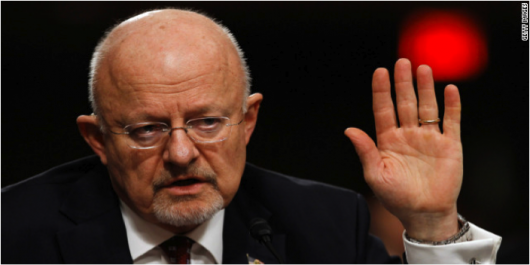 “No sir.” The Director of National Intelligence lied to Congress last year when asked if the NSA collects “any type of data at all on millions or hundreds of millions of Americans.” He later clarified that his answer was “the least untruthful” answer, but there’s no nuance to “no.” In addition, Mr. Clapper quietly signed a directive that bans journalists seeking unclassified information and bans citation of leaked material in the name of national security. This limitation on press contacts appears to ensure that the only news that’s reported is “authorized” news.
“No sir.” The Director of National Intelligence lied to Congress last year when asked if the NSA collects “any type of data at all on millions or hundreds of millions of Americans.” He later clarified that his answer was “the least untruthful” answer, but there’s no nuance to “no.” In addition, Mr. Clapper quietly signed a directive that bans journalists seeking unclassified information and bans citation of leaked material in the name of national security. This limitation on press contacts appears to ensure that the only news that’s reported is “authorized” news.
31. Free Speech Zones
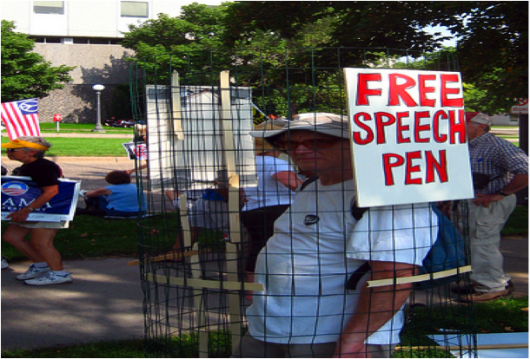
30. Sweet Home School District

29. Child Pornography Laws
 The censoring of award-wining artist Betsy Schneider’s “Quotidian” by the John Michael Kohler Arts Center is indicative of the disturbing tendency that art involving nudity and children is first viewed through the lens of pornography. The Center removed the pieces as a result of complaints concerning nudity, opening the door for public-perception decisions about what is “offensive” art. In a protest letter to the Center, NCAC made an appeal to preserve the Kohler Arts Center’s commitment to artistic freedom while addressing the Center’s larger role in a cultural and political context. “We urge you to return the work to display as an important step not only in preserving the integrity of your institution but in resisting the alarming cultural tendency to see any representation of a naked child as sexual.” The Kohler kept the work out of the exhibition, but it was restored when the show hit the road nationally.
The censoring of award-wining artist Betsy Schneider’s “Quotidian” by the John Michael Kohler Arts Center is indicative of the disturbing tendency that art involving nudity and children is first viewed through the lens of pornography. The Center removed the pieces as a result of complaints concerning nudity, opening the door for public-perception decisions about what is “offensive” art. In a protest letter to the Center, NCAC made an appeal to preserve the Kohler Arts Center’s commitment to artistic freedom while addressing the Center’s larger role in a cultural and political context. “We urge you to return the work to display as an important step not only in preserving the integrity of your institution but in resisting the alarming cultural tendency to see any representation of a naked child as sexual.” The Kohler kept the work out of the exhibition, but it was restored when the show hit the road nationally.
28. Comcast – Time Warner Merger
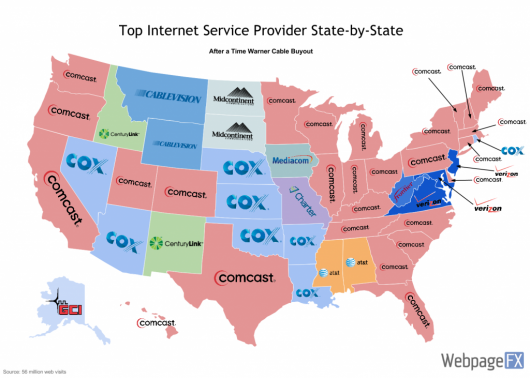 Our commitment to free speech also means open access to a diversity of ideas – some coming from billion dollar media behemoths, some from public interest groups like NCAC. If the $35 billion merger with Time Warner is not stopped, Comcast could end up with 30 percent of the TV market and 38 percent of high-speed Internet customers. This would allow the company to charge discriminatory rates to Internet content providers for high-speed access: small public interest groups may find their content crawling at a snail’s pace because they cannot pay for a fast-track lane. The inevitable price hikes for consumers are the icing on the cake. But more costly than out-of-pocket expenses is the reality that commercially driven media is loyal to advertisers and the government – public interest and neutrality in reporting and practice is rarely a priority.
Our commitment to free speech also means open access to a diversity of ideas – some coming from billion dollar media behemoths, some from public interest groups like NCAC. If the $35 billion merger with Time Warner is not stopped, Comcast could end up with 30 percent of the TV market and 38 percent of high-speed Internet customers. This would allow the company to charge discriminatory rates to Internet content providers for high-speed access: small public interest groups may find their content crawling at a snail’s pace because they cannot pay for a fast-track lane. The inevitable price hikes for consumers are the icing on the cake. But more costly than out-of-pocket expenses is the reality that commercially driven media is loyal to advertisers and the government – public interest and neutrality in reporting and practice is rarely a priority.
27. Sen. Dianne Feinstein
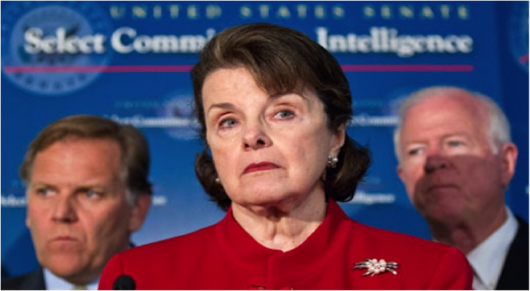
26. Red Flags
Muhlenberg School District Middle School English teachers returned from a National Council of Teachers of English conference with new books to add to their classroom libraries, and were then informed that the books would not be allowed in circulation before they were “checked” for inappropriate content. Since then, teachers have been asked to inventory books and note which ones contained “material that could be considered to be: Culturally Insensitive, Ethnically Insensitive, Religiously Insensitive, Gender Insensitive, or Offensive.” When you red-flag a book, you immediately affect the perception of the reader even before the cover has been cracked open. You reduce literature from a whole work to a few isolated instances that have the potential to be viewed as “mature.” You undermine the educators who selected the title as a significant addition to their curriculum. And you miss an opportunity to provide meaningful information about why a book has been curated into a classroom library as well as a discussion of ideas that make readers stretch out of their comfort zones and challenge their viewpoints.
25. Demise of Tenure
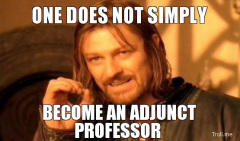
24. Bill Donohue and Tim Wildmon
Catholic League president Bill Donohue and American Family Association president Tim Wildmon are ever vigilant for art that they decide “offends” religious sentiments and eager to mobilize their constituencies to demand its removal from public museums. Indeed, both have found that focusing outrage on religious-themed works of art is an excellent tactic for uniting their troops.
23. War on Whistleblowers
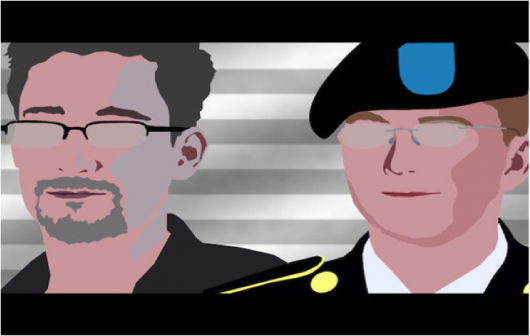
22. Mattel
Tom Forsythe’s “Food Chain Barbie” is a series of photographs depicting Barbie with different vintage kitchen appliances. In an effort to suppress his artwork, Mattel, the makers of Barbie, went on a manhunt. The Court of Appeals held that the copyright, trademark, trade dress, and dilution claims were groundless, unreasonable, and frivolous and awarded Forsythe $1,584,089 in attorney’s fees and $241,797 in costs. This is not the first or the last lawsuit Mattel has engaged in to “protect” Barbie from artists who had included her in their creative work.Nor is Mattel the only company that uses trademark and copyright law to go after artists. Disney is notoriously protective of Mickey Mouse: Andy Warhol had to agree to share copyright with the company before he could use the pop culture icon. Toho, the Japanese company that owns Godzilla, is just as aggressive as the monster himself in protecting their ownership rights. Yet all these creations are part of our collective cultural memory: hasn’t Disney exploited Mickey enough in 86 years, isn’t it time for us to set him free? (In case you are wondering, Barbie has been around for 55 years and Godzilla – 60.)
21. Helicopter Parents

- 1,577 challenges due to “sexually explicit” material
- 1,291 challenges due to “offensive language”
- 989 challenges due to materials deemed “unsuited to age group”
- 619 challenged due to “violence”
- 361 challenges due to “homosexuality”
- 291 challenges due to “religious viewpoint”
- 274 challenges due to “occult” or “Satanic” themes
- 119 because they were “anti-family”
The first step in helping to counter hovering parental controls is to educate about the First Amendment and as the importance of diversity in children’s books.
20. Digital Millennium Copyright Act “Takedowns“
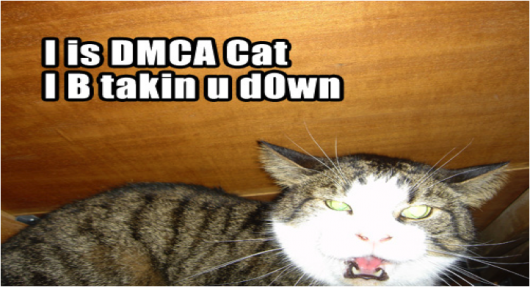 The Digital Millennium Copyright Act (DMCA) allows those who believe their copyright has been infringed to demand the content be taken down from Internet distribution. The target of a takedown notice can file a counter-notice, however, few are aware they have that right and the material must remain offline for 10 to 14 days before being reposted. If ignored, the content host can be subject to lawsuits. There goes fan fiction, parody using film excerpts, and all the wealth of mash up creativity that enriches our digital age. Without a total revamp of the law, DMCA is an easy and cheap way to control Internet content.
The Digital Millennium Copyright Act (DMCA) allows those who believe their copyright has been infringed to demand the content be taken down from Internet distribution. The target of a takedown notice can file a counter-notice, however, few are aware they have that right and the material must remain offline for 10 to 14 days before being reposted. If ignored, the content host can be subject to lawsuits. There goes fan fiction, parody using film excerpts, and all the wealth of mash up creativity that enriches our digital age. Without a total revamp of the law, DMCA is an easy and cheap way to control Internet content.
19. Federal Communications Commission
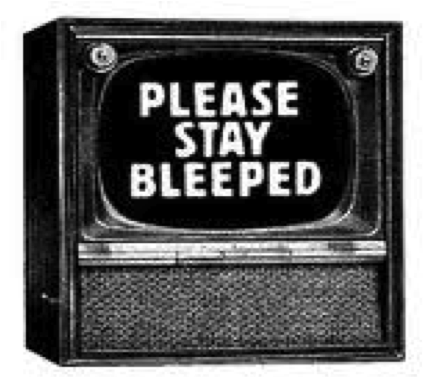 Are you decent? In July 2009, the 2nd U.S. Circuit Court of Appeals ruled that the FCC’s Fleeting Expletive policy, which prohibited “single uses of vulgar words,” was unconstitutional, violating the First Amendment rights of broadcasters. On June 21, 2012, the Supreme Court held that the FCC had exceeded its authority in fining broadcasters for the fleeting nudity and expletives at issue, because the agency had failed to provide adequate notice to broadcasters about what kind of content would be deemed indecent. However, the Court declined to hold that the FCC’s actions violated the First Amendment. The FCC is currently revising its “indecency” guidelines. We are waiting: would Cher – or anyone else be allowed to say “fuck ’em” at a broadcasted awards ceremony? Would Nicole Ritchie dare regale the audience with a story about taking “bullshit” out of her Prada bag? What about Private Ryan – will bleeps accompany the bullets?
Are you decent? In July 2009, the 2nd U.S. Circuit Court of Appeals ruled that the FCC’s Fleeting Expletive policy, which prohibited “single uses of vulgar words,” was unconstitutional, violating the First Amendment rights of broadcasters. On June 21, 2012, the Supreme Court held that the FCC had exceeded its authority in fining broadcasters for the fleeting nudity and expletives at issue, because the agency had failed to provide adequate notice to broadcasters about what kind of content would be deemed indecent. However, the Court declined to hold that the FCC’s actions violated the First Amendment. The FCC is currently revising its “indecency” guidelines. We are waiting: would Cher – or anyone else be allowed to say “fuck ’em” at a broadcasted awards ceremony? Would Nicole Ritchie dare regale the audience with a story about taking “bullshit” out of her Prada bag? What about Private Ryan – will bleeps accompany the bullets?
18. Kansas Board of Regents

17. Gag Orders
Gag orders are a time-honored tool of governments to keep sensitive – or embarrassing – information under wraps. By restricting what healthcare and family planning providers say about abortion, Congress hopes to deny women information that would enable them to get one. By restricting what people can reveal about subpoenas, the government hopes to keep secret the extent of certain surveillance activities. Now teachers are in the crosshairs in order to keep the public ignorant about high stakes testing. In April, Elizabeth Phillips, principal at Public School 321 in Brooklyn, wrote in a New York Times Op-Ed, “I’d like to tell you what was wrong with the tests my students took last week, but I can’t.” New York State’s $32 million contract with education publishing giant Pearson contractually prohibits educators from revealing the nature of standardized test questioning, choking discussion on how to improve the tests. The American Federation of Teachers, NCAC’s partner in supporting educators’ free speech rights, stands with Phillips: “These gag orders and the lack of transparency are fueling the growing distrust and backlash among parents, students and educators in the United States about whether the current testing protocols and testing fixation is in the best interests of children.”
16. Fear of Violence
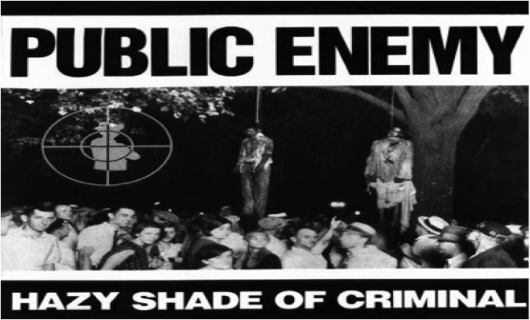 Citing “an unspecified fear of violence” because images of the prophet Mohammed might be used to incite violence “somewhere in the world,” Yale University Press stripped all images of his images from a scholarly book, “The Cartoons That Shook the World,” by Professor Jytte Klausen. This move sets a terrible precedent that violates free expression and academic freedom, as well as opens the door to those who would use the threat of violence to silence others with whom they disagree. Using the fear of actual violence to suppress expression has taken a new twist. Now, rap lyrics are being offered as evidence in criminal trials to suggest that a rapper who sings about violence might engage in it. But an artist rapping about murder is not a murderer. As an amicus brief filed by the New Jersey chapter of the American Civil Liberties Union (ACLU) states, “That a rap artist wrote lyrics seemingly embracing the world of violence is no more reason to ascribe to him a motive and intent to commit violent acts than to saddle Dostoyevsky with Raskolnikov’s motives or to indict Johnny Cash for having ‘shot a man in Reno just to watch him die.'”
Citing “an unspecified fear of violence” because images of the prophet Mohammed might be used to incite violence “somewhere in the world,” Yale University Press stripped all images of his images from a scholarly book, “The Cartoons That Shook the World,” by Professor Jytte Klausen. This move sets a terrible precedent that violates free expression and academic freedom, as well as opens the door to those who would use the threat of violence to silence others with whom they disagree. Using the fear of actual violence to suppress expression has taken a new twist. Now, rap lyrics are being offered as evidence in criminal trials to suggest that a rapper who sings about violence might engage in it. But an artist rapping about murder is not a murderer. As an amicus brief filed by the New Jersey chapter of the American Civil Liberties Union (ACLU) states, “That a rap artist wrote lyrics seemingly embracing the world of violence is no more reason to ascribe to him a motive and intent to commit violent acts than to saddle Dostoyevsky with Raskolnikov’s motives or to indict Johnny Cash for having ‘shot a man in Reno just to watch him die.'”
15. Justice Clarence Thomas

14. Boycotts of Boycotts
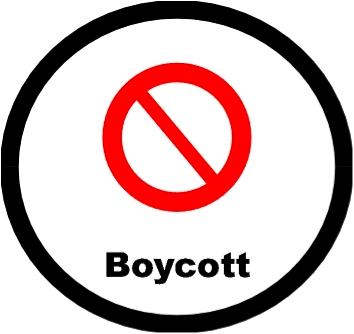 Legislative proposals to penalize faculty members who are active in professional associations that endorse boycotts of academic institutions in other countries violate the First Amendment rights of that faculty. While the language of these types of proposals, like those introduced in New York, Maryland, and Illinois, varies, their purpose is similar: to penalize professional associations and their members for protesting certain policies of the Israeli government by endorsing a boycott of Israeli academic institutions. Regardless of how one views academic boycotts by private professional organizations, faculty at state-supported colleges and universities have a constitutionally protected right to express unpopular political views, to associate with like-minded individuals, and to engage in collective political activities.
Legislative proposals to penalize faculty members who are active in professional associations that endorse boycotts of academic institutions in other countries violate the First Amendment rights of that faculty. While the language of these types of proposals, like those introduced in New York, Maryland, and Illinois, varies, their purpose is similar: to penalize professional associations and their members for protesting certain policies of the Israeli government by endorsing a boycott of Israeli academic institutions. Regardless of how one views academic boycotts by private professional organizations, faculty at state-supported colleges and universities have a constitutionally protected right to express unpopular political views, to associate with like-minded individuals, and to engage in collective political activities.
13. Texas Board of Education
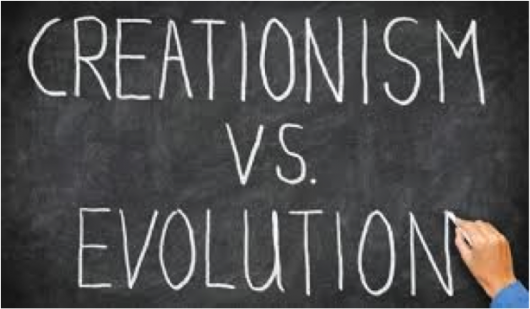 National Center for Science Education, among many organizations, is speaking out in opposition of the rewrite of history and censorship of evolution in textbooks. It is no secret that holders of political power have always tried to impose their own views of history, and questions of emphasis and perspective will always be debated. However, the Texas Board of Education as well as a review committee in Tennessee, both composed chiefly of laypeople, not historians or educators, decided to “stand up to experts” and substitute their personal religious and ideological perspectives as fact. Teaching ideological conformity with any agenda will not produce the informed, independent-minded citizens U.S. democracy urgently needs.
National Center for Science Education, among many organizations, is speaking out in opposition of the rewrite of history and censorship of evolution in textbooks. It is no secret that holders of political power have always tried to impose their own views of history, and questions of emphasis and perspective will always be debated. However, the Texas Board of Education as well as a review committee in Tennessee, both composed chiefly of laypeople, not historians or educators, decided to “stand up to experts” and substitute their personal religious and ideological perspectives as fact. Teaching ideological conformity with any agenda will not produce the informed, independent-minded citizens U.S. democracy urgently needs.
12. Department of Justice

11. Facebook
 Although other private Internet intermediaries also set restrictive terms of service, Facebook goes the farthest: its ban on nudity has led to the removal of images from an art project featuring beautiful body painting over mastectomy scars, as well as to many announcements for art shows. The process, which allows for content to be taken down after so many clicks of the “abuse” button has also led to the removal of political calls for action. Really, do FB users need to be “protected” that much?
Although other private Internet intermediaries also set restrictive terms of service, Facebook goes the farthest: its ban on nudity has led to the removal of images from an art project featuring beautiful body painting over mastectomy scars, as well as to many announcements for art shows. The process, which allows for content to be taken down after so many clicks of the “abuse” button has also led to the removal of political calls for action. Really, do FB users need to be “protected” that much?
10. “Blame Video Games!”

9. Government Opacity
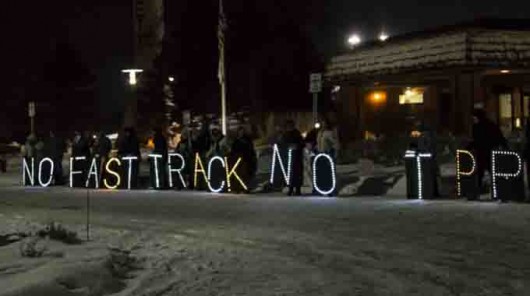
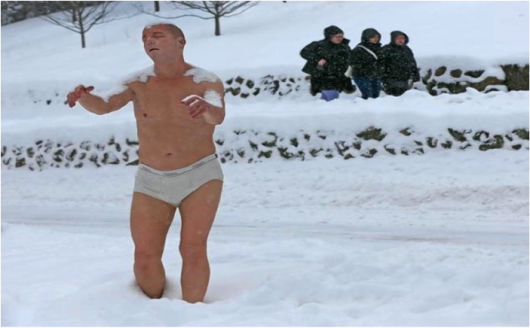
7. “Juvenoia”
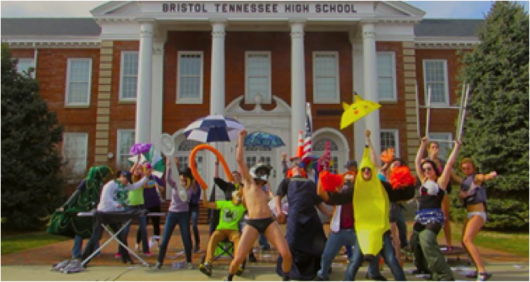 What happened to letting youth make harmless mistakes? With more than 100 teens from Florida to Minnesota being suspended from school and extracurricular activities for creating or participating in their own videos and posting them online, many questions arise: What are students rights for free expression? Is it in violation to police students’ use of social media? Is the Harlem Shakedown threatening academic focus? Isn’t suspending kids for social media hijinks not only risking free speech and creative expression but also taking them out of an educational setting where they could be learning responsible online behavior?
What happened to letting youth make harmless mistakes? With more than 100 teens from Florida to Minnesota being suspended from school and extracurricular activities for creating or participating in their own videos and posting them online, many questions arise: What are students rights for free expression? Is it in violation to police students’ use of social media? Is the Harlem Shakedown threatening academic focus? Isn’t suspending kids for social media hijinks not only risking free speech and creative expression but also taking them out of an educational setting where they could be learning responsible online behavior?
6. Political Correctness

5. Scared School Boards
 School boards have come to exist in a constant state of fear. Facing increasing demands from community leaders, parents, church organizations, and students themselves to control student exposure to topics ranging from sexual-orientation issues to social media posts to uncomfortable book themes, school boards are cowering. Without continued support for First Amendment rights and recognition of the need for free expression, schools will continue to bend to the will of the strongest fear-monger. NCAC’s Kids’ Right to Read Project, co-founded by the American Booksellers Foundation for Free Expression, works tirelessly to uphold the support for school boards so that they can, in turn, uphold the constitutional rights of students, teachers, and administrators.
School boards have come to exist in a constant state of fear. Facing increasing demands from community leaders, parents, church organizations, and students themselves to control student exposure to topics ranging from sexual-orientation issues to social media posts to uncomfortable book themes, school boards are cowering. Without continued support for First Amendment rights and recognition of the need for free expression, schools will continue to bend to the will of the strongest fear-monger. NCAC’s Kids’ Right to Read Project, co-founded by the American Booksellers Foundation for Free Expression, works tirelessly to uphold the support for school boards so that they can, in turn, uphold the constitutional rights of students, teachers, and administrators.
4. National Security Agency

3. Self-Censorship
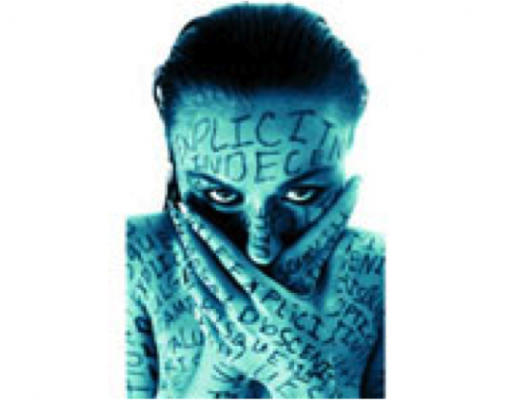
2. A Net without Neutrality
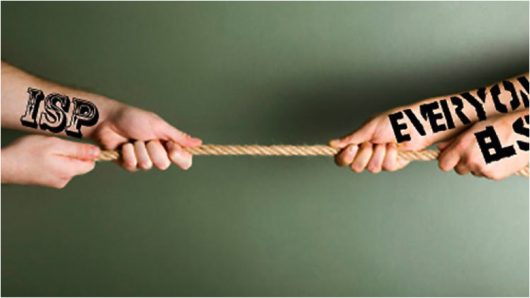
1. Apathy
The single greatest threat to free speech in 2014 is indifference. We often don’t hear about censorship incidents occurring across communities nationwide until they affect us individually. When we do, we ask, “What can I really do about it?” or throw our hands up or heads down in surrender to the barrage of negativity. This is what you can do: stay alert to local free speech threats; take action by reporting incidents, organizing petitions or protests, and making your voice heard; and support the work of the National Coalition Against Censorship, who takes up the fight every day to protect your right to explore, think and create.


